Runchu Tian
Finish First, Perfect Later: Test-Time Token-Level Cross-Validation for Diffusion Large Language Models
Oct 06, 2025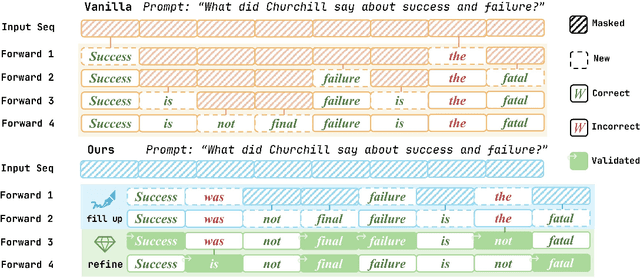



Abstract:Diffusion large language models (dLLMs) have recently emerged as a promising alternative to autoregressive (AR) models, offering advantages such as accelerated parallel decoding and bidirectional context modeling. However, the vanilla decoding strategy in discrete dLLMs suffers from a critical limitation: once a token is accepted, it can no longer be revised in subsequent steps. As a result, early mistakes persist across iterations, harming both intermediate predictions and final output quality. To address this issue, we propose Tolerator (Token-Level Cross-Validation Refinement), a training-free decoding strategy that leverages cross-validation among predicted tokens. Unlike existing methods that follow a single progressive unmasking procedure, Tolerator introduces a two-stage process: (i) sequence fill-up and (ii) iterative refinement by remasking and decoding a subset of tokens while treating the remaining as context. This design enables previously accepted tokens to be reconsidered and corrected when necessary, leading to more reliable diffusion decoding outputs. We evaluate Tolerator on five standard benchmarks covering language understanding, code generation, and mathematics. Experiments show that our method achieves consistent improvements over the baselines under the same computational budget. These findings suggest that decoding algorithms are crucial to realizing the full potential of diffusion large language models. Code and data are publicly available.
Topic Coverage-based Demonstration Retrieval for In-Context Learning
Sep 15, 2025Abstract:The effectiveness of in-context learning relies heavily on selecting demonstrations that provide all the necessary information for a given test input. To achieve this, it is crucial to identify and cover fine-grained knowledge requirements. However, prior methods often retrieve demonstrations based solely on embedding similarity or generation probability, resulting in irrelevant or redundant examples. In this paper, we propose TopicK, a topic coverage-based retrieval framework that selects demonstrations to comprehensively cover topic-level knowledge relevant to both the test input and the model. Specifically, TopicK estimates the topics required by the input and assesses the model's knowledge on those topics. TopicK then iteratively selects demonstrations that introduce previously uncovered required topics, in which the model exhibits low topical knowledge. We validate the effectiveness of TopicK through extensive experiments across various datasets and both open- and closed-source LLMs. Our source code is available at https://github.com/WonbinKweon/TopicK_EMNLP2025.
Beyond True or False: Retrieval-Augmented Hierarchical Analysis of Nuanced Claims
Jun 12, 2025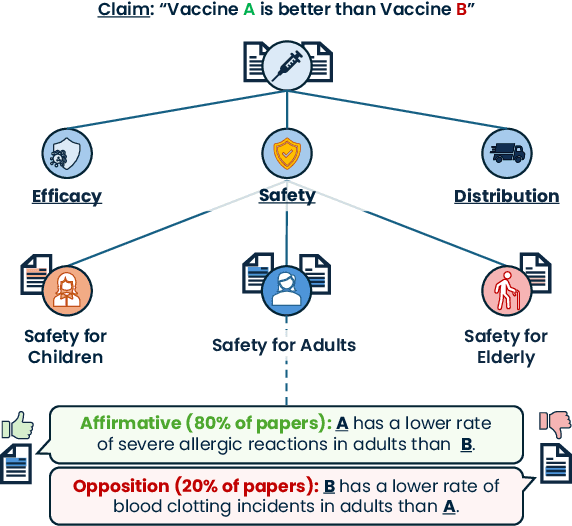
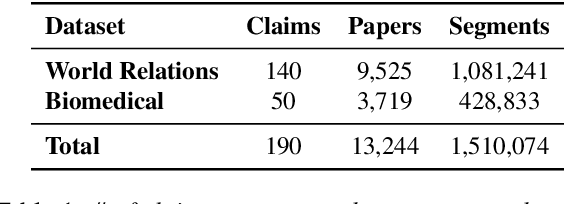


Abstract:Claims made by individuals or entities are oftentimes nuanced and cannot be clearly labeled as entirely "true" or "false" -- as is frequently the case with scientific and political claims. However, a claim (e.g., "vaccine A is better than vaccine B") can be dissected into its integral aspects and sub-aspects (e.g., efficacy, safety, distribution), which are individually easier to validate. This enables a more comprehensive, structured response that provides a well-rounded perspective on a given problem while also allowing the reader to prioritize specific angles of interest within the claim (e.g., safety towards children). Thus, we propose ClaimSpect, a retrieval-augmented generation-based framework for automatically constructing a hierarchy of aspects typically considered when addressing a claim and enriching them with corpus-specific perspectives. This structure hierarchically partitions an input corpus to retrieve relevant segments, which assist in discovering new sub-aspects. Moreover, these segments enable the discovery of varying perspectives towards an aspect of the claim (e.g., support, neutral, or oppose) and their respective prevalence (e.g., "how many biomedical papers believe vaccine A is more transportable than B?"). We apply ClaimSpect to a wide variety of real-world scientific and political claims featured in our constructed dataset, showcasing its robustness and accuracy in deconstructing a nuanced claim and representing perspectives within a corpus. Through real-world case studies and human evaluation, we validate its effectiveness over multiple baselines.
LLM-Based Compact Reranking with Document Features for Scientific Retrieval
May 19, 2025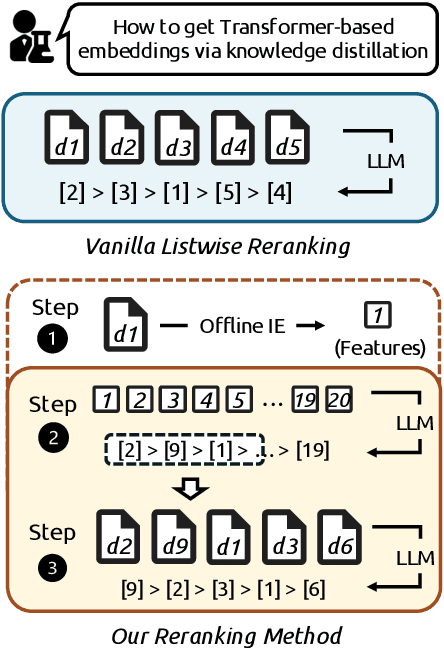
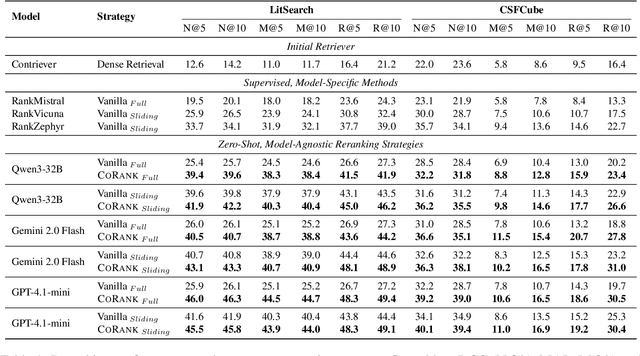

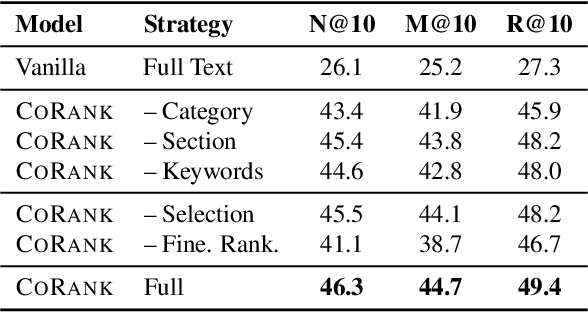
Abstract:Scientific retrieval is essential for advancing academic discovery. Within this process, document reranking plays a critical role by refining first-stage retrieval results. However, large language model (LLM) listwise reranking faces unique challenges in the scientific domain. First-stage retrieval is often suboptimal in the scientific domain, so relevant documents are ranked lower. Moreover, conventional listwise reranking uses the full text of candidate documents in the context window, limiting the number of candidates that can be considered. As a result, many relevant documents are excluded before reranking, which constrains overall retrieval performance. To address these challenges, we explore compact document representations based on semantic features such as categories, sections, and keywords, and propose a training-free, model-agnostic reranking framework for scientific retrieval called CoRank. The framework involves three stages: (i) offline extraction of document-level features, (ii) coarse reranking using these compact representations, and (iii) fine-grained reranking on full texts of the top candidates from stage (ii). This hybrid design provides a high-level abstraction of document semantics, expands candidate coverage, and retains critical details required for precise ranking. Experiments on LitSearch and CSFCube show that CoRank significantly improves reranking performance across different LLM backbones, increasing nDCG@10 from 32.0 to 39.7. Overall, these results highlight the value of information extraction for reranking in scientific retrieval.
Distance between Relevant Information Pieces Causes Bias in Long-Context LLMs
Oct 18, 2024



Abstract:Positional bias in large language models (LLMs) hinders their ability to effectively process long inputs. A prominent example is the "lost in the middle" phenomenon, where LLMs struggle to utilize relevant information situated in the middle of the input. While prior research primarily focuses on single pieces of relevant information, real-world applications often involve multiple relevant information pieces. To bridge this gap, we present LongPiBench, a benchmark designed to assess positional bias involving multiple pieces of relevant information. Thorough experiments are conducted with five commercial and six open-source models. These experiments reveal that while most current models are robust against the "lost in the middle" issue, there exist significant biases related to the spacing of relevant information pieces. These findings highlight the importance of evaluating and reducing positional biases to advance LLM's capabilities.
DebugBench: Evaluating Debugging Capability of Large Language Models
Jan 11, 2024

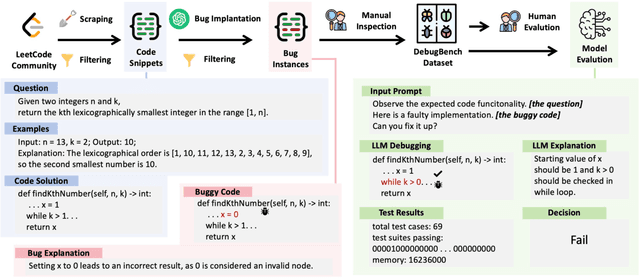

Abstract:Large Language Models (LLMs) have demonstrated exceptional coding capability. However, as another critical component of programming proficiency, the debugging capability of LLMs remains relatively unexplored. Previous evaluations of LLMs' debugging ability are significantly limited by the risk of data leakage, the scale of the dataset, and the variety of tested bugs. To overcome these deficiencies, we introduce `DebugBench', an LLM debugging benchmark consisting of 4,253 instances. It covers four major bug categories and 18 minor types in C++, Java, and Python. To construct DebugBench, we collect code snippets from the LeetCode community, implant bugs into source data with GPT-4, and assure rigorous quality checks. We evaluate two commercial and three open-source models in a zero-shot scenario. We find that (1) while closed-source models like GPT-4 exhibit inferior debugging performance compared to humans, open-source models such as Code Llama fail to attain any pass rate scores; (2) the complexity of debugging notably fluctuates depending on the bug category; (3) incorporating runtime feedback has a clear impact on debugging performance which is not always helpful. As an extension, we also compare LLM debugging and code generation, revealing a strong correlation between them for closed-source models. These findings will benefit the development of LLMs in debugging.
ToolLLM: Facilitating Large Language Models to Master 16000+ Real-world APIs
Jul 31, 2023Abstract:Despite the advancements of open-source large language models (LLMs) and their variants, e.g., LLaMA and Vicuna, they remain significantly limited in performing higher-level tasks, such as following human instructions to use external tools (APIs). This is because current instruction tuning largely focuses on basic language tasks instead of the tool-use domain. This is in contrast to state-of-the-art (SOTA) LLMs, e.g., ChatGPT, which have demonstrated excellent tool-use capabilities but are unfortunately closed source. To facilitate tool-use capabilities within open-source LLMs, we introduce ToolLLM, a general tool-use framework of data construction, model training and evaluation. We first present ToolBench, an instruction-tuning dataset for tool use, which is created automatically using ChatGPT. Specifically, we collect 16,464 real-world RESTful APIs spanning 49 categories from RapidAPI Hub, then prompt ChatGPT to generate diverse human instructions involving these APIs, covering both single-tool and multi-tool scenarios. Finally, we use ChatGPT to search for a valid solution path (chain of API calls) for each instruction. To make the searching process more efficient, we develop a novel depth-first search-based decision tree (DFSDT), enabling LLMs to evaluate multiple reasoning traces and expand the search space. We show that DFSDT significantly enhances the planning and reasoning capabilities of LLMs. For efficient tool-use assessment, we develop an automatic evaluator: ToolEval. We fine-tune LLaMA on ToolBench and obtain ToolLLaMA. Our ToolEval reveals that ToolLLaMA demonstrates a remarkable ability to execute complex instructions and generalize to unseen APIs, and exhibits comparable performance to ChatGPT. To make the pipeline more practical, we devise a neural API retriever to recommend appropriate APIs for each instruction, negating the need for manual API selection.
Exploring Format Consistency for Instruction Tuning
Jul 28, 2023



Abstract:Instruction tuning has emerged as a promising approach to enhancing large language models in following human instructions. It is shown that increasing the diversity and number of instructions in the training data can consistently enhance generalization performance, which facilitates a recent endeavor to collect various instructions and integrate existing instruction tuning datasets into larger collections. However, different users have their unique ways of expressing instructions, and there often exist variations across different datasets in the instruction styles and formats, i.e., format inconsistency. In this work, we study how format inconsistency may impact the performance of instruction tuning. We propose a framework called "Unified Instruction Tuning" (UIT), which calls OpenAI APIs for automatic format transfer among different instruction tuning datasets. We show that UIT successfully improves the generalization performance on unseen instructions, which highlights the importance of format consistency for instruction tuning. To make the UIT framework more practical, we further propose a novel perplexity-based denoising method to reduce the noise of automatic format transfer. We also train a smaller offline model that achieves comparable format transfer capability than OpenAI APIs to reduce costs in practice.
Tool Learning with Foundation Models
Apr 17, 2023Abstract:Humans possess an extraordinary ability to create and utilize tools, allowing them to overcome physical limitations and explore new frontiers. With the advent of foundation models, AI systems have the potential to be equally adept in tool use as humans. This paradigm, i.e., tool learning with foundation models, combines the strengths of specialized tools and foundation models to achieve enhanced accuracy, efficiency, and automation in problem-solving. Despite its immense potential, there is still a lack of a comprehensive understanding of key challenges, opportunities, and future endeavors in this field. To this end, we present a systematic investigation of tool learning in this paper. We first introduce the background of tool learning, including its cognitive origins, the paradigm shift of foundation models, and the complementary roles of tools and models. Then we recapitulate existing tool learning research into tool-augmented and tool-oriented learning. We formulate a general tool learning framework: starting from understanding the user instruction, models should learn to decompose a complex task into several subtasks, dynamically adjust their plan through reasoning, and effectively conquer each sub-task by selecting appropriate tools. We also discuss how to train models for improved tool-use capabilities and facilitate the generalization in tool learning. Considering the lack of a systematic tool learning evaluation in prior works, we experiment with 17 representative tools and show the potential of current foundation models in skillfully utilizing tools. Finally, we discuss several open problems that require further investigation for tool learning. Overall, we hope this paper could inspire future research in integrating tools with foundation models.
 Add to Chrome
Add to Chrome Add to Firefox
Add to Firefox Add to Edge
Add to Edge